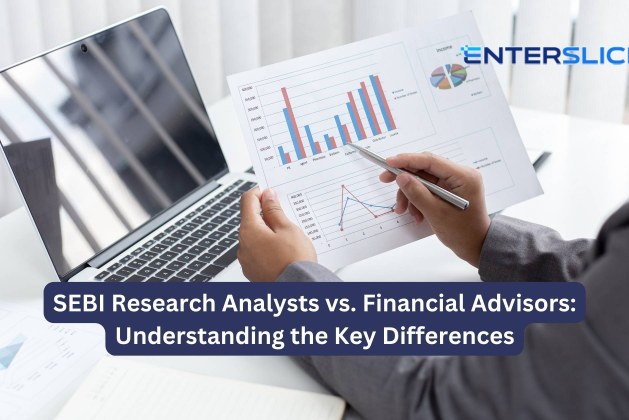In the world of finance, both SEBI Research Analysts and Financial Advisors play vital roles in helping individuals and businesses make informed financial decisions. While they might seem similar at first glance, there are significant differences between the two. These differences primarily revolve around their functions, qualifications, and regulatory requirements. Understanding these distinctions is essential for investors looking to navigate the financial landscape effectively.
In this blog, we’ll delve into the key differences between SEBI Research Analysts and Financial Advisors, so you can make well-informed choices based on your financial goals.
1. Role and Function
The primary difference between a SEBI Research Analyst and a Financial Advisor lies in their role and the services they provide.
SEBI Research Analysts specialize in researching and analyzing financial markets, companies, and economic trends. Their primary task is to provide investment research reports based on their findings. They use data, statistics, and market insights to offer investment recommendations, including buying, holding, or selling stocks, bonds, or other financial instruments. These research reports are meant to assist investors in making educated decisions regarding their portfolios.
On the other hand, Financial Advisors take a more holistic approach to managing an individual’s or a company’s finances. They provide personalized financial planning services, focusing on wealth management, retirement planning, tax planning, estate planning, and more. Financial advisors aim to help clients achieve their long-term financial goals, which could include saving for retirement, buying a home, or funding their children’s education.
2. Qualifications and Regulatory Framework
To operate as a SEBI Research Analyst, one must meet certain qualifications and undergo a registration process with the Securities and Exchange Board of India (SEBI). SEBI mandates that research analysts must possess specific educational qualifications, such as a post-graduate degree or professional qualifications in finance, economics, or related fields. Additionally, they must complete the SEBI Research Analyst Examination to obtain registration.
Once registered, SEBI Research Analysts must comply with SEBI’s strict code of conduct and regulatory framework, ensuring their research is transparent, unbiased, and in line with investor protection norms. They are also required to disclose any potential conflicts of interest and maintain a high level of professionalism in their recommendations.
In contrast, Financial Advisors may have a range of qualifications depending on their specialization. Some may hold certifications such as the Certified Financial Planner (CFP), Chartered Financial Analyst (CFA), or other finance-related qualifications. While financial advisors aren’t specifically regulated by SEBI, they must comply with guidelines set by organizations like the Financial Planning Standards Board (FPSB) and other regulatory bodies. Financial advisors are also expected to operate under ethical standards that ensure client interests come first.
3. Scope of Services
The scope of services provided by SEBI Research Analysts is narrower compared to Financial Advisors. Research analysts focus on investment-related analysis. They specialize in providing research reports on specific securities, sectors, or market conditions. These reports are typically used by institutional investors, portfolio managers, and traders, though individual investors can also benefit from their insights.
Financial Advisors, however, offer a more comprehensive range of services. They not only help with investment strategies but also provide advice on budgeting, debt management, insurance, and tax planning. Financial advisors work closely with their clients to develop personalized strategies that align with the client’s financial goals, risk tolerance, and time horizon. They often guide clients through life stages such as retirement, buying a home, or managing their estate.
4. Client Interaction and Relationship
SEBI Research Analysts primarily deal with clients in a more transactional manner. They publish research reports and provide recommendations, but the interaction is typically less personalized. Their focus is on delivering objective, data-driven insights to investors looking to make informed investment decisions. The relationship between a SEBI Research Analyst and their client is often short-term or based on specific investment queries or market analysis needs.
In contrast, Financial Advisors build long-term relationships with their clients. They work closely with clients to understand their financial aspirations, risk appetite, and personal circumstances. Advisors often conduct regular reviews and provide ongoing guidance to ensure that their clients stay on track with their financial goals. This level of personalization and continuous support is a key characteristic of financial advising.
5. Remuneration and Compensation Structure
SEBI Research Analysts are typically compensated based on their research services. This could include earning fees from publishing reports, providing consulting services to institutional investors, or working for financial firms that offer investment research. In some cases, they may receive compensation based on the volume of assets invested or specific transactions made using their research recommendations.
Financial Advisors usually receive compensation in one of two ways: fee-based or commission-based. Fee-based advisors charge clients directly for their services, either as a flat fee or a percentage of assets under management. Commission-based advisors, on the other hand, earn a commission from selling financial products such as insurance policies, mutual funds, or retirement plans. Some financial advisors may use a combination of both fee and commission-based compensation structures.
6. Ethical Standards and Conflicts of Interest
Both SEBI Research Analysts and Financial Advisors are held to high ethical standards, but the nature of their work exposes them to different potential conflicts of interest. SEBI Research Analysts must be transparent about their potential conflicts, especially if they have investments in the securities they are recommending. SEBI has strict rules to ensure analysts provide impartial and unbiased research, protecting investors from misleading or conflicted advice.
Financial Advisors, meanwhile, must also disclose any conflicts of interest, particularly if they are recommending financial products that would earn them a commission. While the ethical standards for both professions are high, the nature of the services they provide requires ongoing transparency to avoid conflicts that could harm clients’ financial interests.
Conclusion
Both SEBI Research Analysts and Financial Advisors serve important functions within the financial ecosystem, but their roles are distinct. SEBI Research Analysts specialize in providing research-backed investment recommendations, while Financial Advisors offer personalized financial planning services that encompass a broader range of financial goals.
Understanding the differences between these two roles can help individuals and businesses decide which professional service best aligns with their needs. Whether you’re looking for in-depth investment analysis or comprehensive financial planning, both professionals play crucial roles in navigating the complex world of finance.
Frequently Asked Questions (FAQs)
1. What is the main difference between a SEBI Research Analyst and a Financial Advisor?
A SEBI Research Analyst focuses on providing research-based investment recommendations and market insights, while a Financial Advisor offers a broader range of financial services, including investment planning, retirement planning, and tax advice.
2. How can I become a SEBI Research Analyst?
To become a SEBI Research Analyst, you must meet the qualifications specified by SEBI, pass the SEBI Research Analyst Examination, and obtain registration with SEBI.
3. Can a Financial Advisor also be a SEBI Research Analyst?
Yes, a Financial Advisor can also be a SEBI Research Analyst if they meet the qualifications and registration requirements set by SEBI. However, their roles and responsibilities will differ depending on the services they offer.
Also, read:
Stock Broker License Registration with SEBI
What is a Collective Investment Scheme in India?




Leave a comment